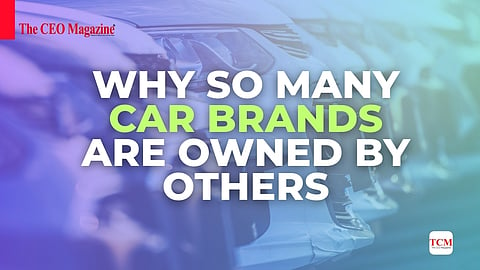
- News
- Women
- Magazine
- IndustryIndustry
- InsightsInsights
- Success Stories
- PublishPublish
- ContactContact
- Media KitMedia Kit

Why So Many Car Brands Are Owned by Others
Car manufacturing is capital-intensive. R&D, safety regulations, evolving emission standards, and the rapid shift toward electric vehicles (EVs) have made it harder for small or standalone brands to survive. The solution? Bigger corporations absorbing smaller ones, consolidating resources, and expanding global reach.
For you, the customer, this means your car might come with engineering DNA from several companies and continents.
Here’s a clear guide showing who owns which brand in 2025. Some of these companies also have alliances and shared platforms, making the relationships even more interconnected.
Brands: Chevrolet, GMC, Cadillac, Buick
Notes: GM was once the world’s largest carmaker. While it has exited markets like India, its vehicles are still found in North America and China. Hummer is now a sub-brand under GMC.
Brands: Ford, Lincoln
Notes: Once owned Volvo, Jaguar, and Land Rover, but now focuses solely on Ford and its luxury arm Lincoln.
Brands: Jeep, Chrysler, Dodge, Ram, Fiat, Alfa Romeo, Maserati
Notes: Formed by merging Fiat Chrysler Automobiles and Peugeot S.A., Stellantis now controls a vast range of brands across Europe and the U.S. Jeep, though American by legacy, is now part of this European powerhouse.
Brands: Volkswagen, Audi, Porsche, Bentley, Lamborghini, SEAT, Skoda, Cupra
Notes: VW owns some of the world’s most iconic performance and luxury brands. The group is also investing heavily in EVs with its ID series.
Brands: Toyota, Lexus
Notes: Known for reliability and innovation, Toyota also holds stakes in Subaru and Suzuki. It collaborates with Mazda and Daihatsu on various projects.
Brands: Hyundai, Kia, Genesis
Notes: Hyundai and Kia are now global powerhouses. Genesis is their luxury offering and is gaining popularity in the U.S. and Middle East.
Brands: Jaguar, Range Rover, Defender, Discovery
Notes: Tata made global headlines when it acquired Jaguar and Land Rover from Ford in 2008. It continues to invest in these premium British brands under the JLR (Jaguar Land Rover) umbrella.
Brands: Renault, Nissan, Mitsubishi, Infiniti, Dacia
Notes: One of the world’s largest auto alliances, this group shares technology and manufacturing platforms across its brands.
Brands: BMW, Mini, Rolls-Royce
Notes: While it owns the ultra-luxury Rolls-Royce brand, BMW remains deeply committed to performance and design.
Brands: Mercedes-Benz, Smart
Notes: Known for innovation and luxury, Mercedes-Benz is now accelerating into electric mobility with its EQ lineup.
Brands: Volvo, Polestar, Lotus
Notes: Geely is one of China’s biggest automakers and owns several major international brands. Polestar is its premium EV line.
Brands: Honda, Acura, Afeela (joint venture with Sony)
Notes: Honda’s joint venture with Sony is building the futuristic Afeela EVs. Acura is its premium brand for North America.
Brand: Rivian
Notes: Backed by Amazon and Ford, Rivian is focused on electric pickup trucks and SUVs. It’s still independent but closely watched.
Brand: Tesla
Notes: Elon Musk’s company is not owned by anyone else and remains one of the few major independent automakers.
Brand: VinFast
Notes: A new entrant, VinFast is aggressively targeting global EV markets, including India and the U.S.
For Indian consumers, Tata Motors is a point of pride. Owning iconic British brands like Jaguar and Land Rover has elevated India’s place on the global automotive stage.
Maruti Suzuki continues to be the dominant player in India’s mass-market car segment, though Suzuki is technically a Japanese company with a small stake held by Toyota. Hyundai and Kia have built extensive manufacturing operations in India and now rank second in market share after Maruti.
Luxury buyers in India often go for German brands like BMW, Audi, and Mercedes-Benz, all owned by larger European groups. Yet the cars are increasingly assembled locally, thanks to the government’s push for "Make in India" and lower import duties.
Some brands are no longer in production but are common in the used-car market:
Pontiac (GM)
Scion (Toyota)
Mercury (Ford)
Saab (owned by Saab AB; some assets with National Electric Vehicle Sweden)
Just because a brand is retired doesn’t mean it’s irrelevant. Many of these vehicles are still supported for parts and services.
Understanding who owns your car brand helps you:
Know what kind of after-sales support to expect
Learn about safety and reliability ratings shared across group brands
Track global trends in EV adoption and tech upgrades
Make informed choices about resale value and maintenance
When you buy a Volvo, you’re benefiting from Chinese investment in Swedish engineering. When you choose a Jeep, your money goes to a Netherlands-based conglomerate. And if you’re considering a Range Rover, you’re also supporting an Indian giant.
The car badge on your bonnet tells only part of the story. The real power lies in boardrooms and strategy rooms of global corporations. Whether you're buying a family sedan, a rugged SUV, or an electric coupe, knowing the parent company behind your favorite car brand adds valuable context, and could influence your next big purchase.
As new technologies emerge and global competition heats up, this list is sure to evolve. Stay tuned, stay informed, and drive smart.
Follow us on Google News
